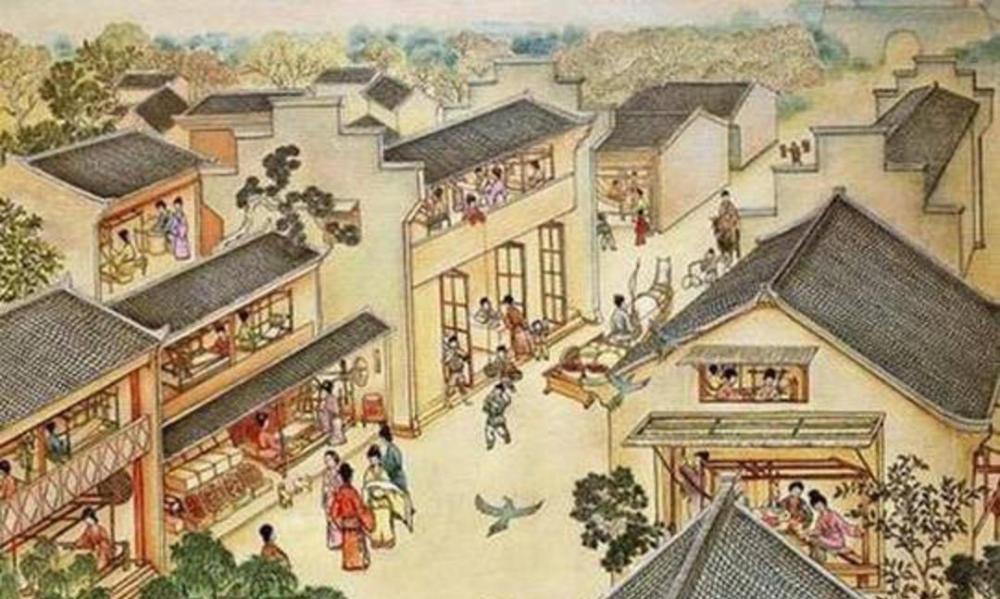Cover news reporter Li Yuxin
"The end of the year is the tail tooth, and the feast is today." January 18, the sixteenth day of the lunar month. At present, perhaps many young children do not know the special meaning of this day, but travel back in time to ancient society and find that merchants will be particularly busy and active on this day. In the old days, people called the sixteenth day of the waxing moon "tail teeth" or "inverted teeth". The tail teeth, also known as "tail", and "tail", are mainly popular in the southeast coastal areas. Worship the land lord, feast on the guys, beat the teeth... This is the "end" of the busy year for businessmen, and it is also the "first sound" of the Spring Festival activities of ordinary people.

Ancient Bazaar Map
Why is it called the sixteenth of the waxing moon "tail teeth"? It is reported that "tooth" is a Chinese folk ritual to worship the land gong, and worshiping the land gong, also known as "making teeth". In the traditional custom, on the second and sixteenth day of the first month of the lunar calendar, businessmen must prepare some three animals and four fruits, incense sticks and paper money to worship the land lord. Merchants call the second day of the second month of the lunar calendar the head tooth, and the sixteenth day of the waxing moon in December is the tail tooth. Among them, the last sacrifice at the end of the year, "tail teeth", is particularly important for merchants. In ancient times, there was a poem "A year of guys pay a cup of wine, ten thousand cigarettes thank the earth god", which is the scene of the tail teeth described by the poets in the old times.
On this day, the most important thing is naturally to worship the land lord and let the land public "eat well and drink well." Because in the cognition of the ancients, the land god protected the god for the merchants, in order to bless the New Year's market, so the merchants' "tail teeth" banquet was particularly rich. After the worship, the dishes used can be eaten by employees or family members, and some merchants set up a thank you banquet to reward the workers for a year's hard work, and the merchants will thank the dentists with good wine and good dishes and distribute them to the employees, which is called "tooth sacrifice" and "tail teeth". It can be said that the popular "annual meeting" in modern enterprises actually implies the figure of "tail teeth".
The dish white chopped chicken on the tail tooth feast
In Chengdu, the country of Tianfu, the custom of "tail teeth" was also popular in the old days. According to folklore expert Liu Xiaochang, in the past, Chengdu people used to eat a meal of meat on the second and sixteenth day of the first month as the "tooth beating festival". In those years when the material conditions were not developed, "eating meat" was not something that ordinary people could do frequently. "Seventy or eighty years ago, not every day there was meat to eat, can eat meat in the second and sixteenth days of the first year, this family is considered to be the upper middle level, the average person can not eat meat for a month is most of the time." Liu Xiaochang sighed that now people's living standards have been greatly improved, and every household has meat to eat almost every day. But in the past, on the day of "tail teeth", a tooth sacrifice and meat were the hopes of many ordinary people.
"In the past, when Chengdu was approaching the New Year's Pass, the sixteenth day of the Waxing Moon collapsed its teeth, and the family always had to find a way to cut a little meat to go home. At the end of the year, the last tooth sacrifice, to be able to have meat to eat, was a very happy thing for the whole family at that time. Liu Xiaochang described that in the 1930s and 1940s, when the elders could only buy one or two pounds of meat on the day of the New Year's Festival, it was a very glorious thing to be able to tie it from one end of the street to the other end of the street. It is worth mentioning that in the old days, when Chengdu people ate meat with their teeth upside down, they did not forget to worship their ancestors, and after taking the meat back and cooking it, it was used as a knife head, and it was first placed on the shrine to worship the ancestors before eating. "At that time, chengdu people were on the second and sixteenth day of the first month of each month, and it was already a very strange thing to have a tooth sacrifice."
Land Gongmu Mask Collection of China Three Gorges Museum, Chongqing
Tail teeth seem to be lively and can fight tooth sacrifices, but for the workers of the old society, this taste is not good. There is a saying that if a businessman is not prepared to renew his employment in the coming year, he will aim his chicken head at him at the feast, implying dismissal. Liu Xiaochang also mentioned that this meal is "not good for the workers", because everyone will be worried, afraid that after eating this meal, their livelihood in the next year will be lost. However, with the development of society, this custom has gradually disappeared. Nowadays, most of the "tail teeth" of enterprises are held in the form of "annual meetings", and employees gather for meals, lottery, and performances to welcome the arrival of the New Year in a lively atmosphere.
Folklore expert Liu Xiaochang